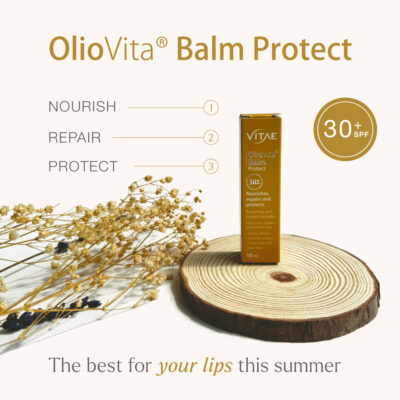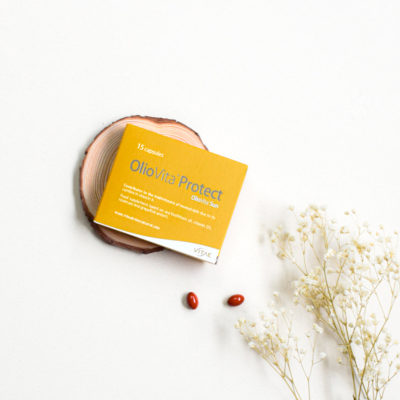Having a healthy skin depends on many factors such as pollution, stress, diet, sun … so taking care of it should be a 360º mission, with special emphasis on properly protect the skin from the sun.
Fran Ballesteros, pharmacist and Vitae educator tells us five points to consider for having healthy skin.
Let’s talk about skin. We only see the external part and it is the one that we usually take care of, however it is in the inner skin layers where damage occurs, resulting in spots, wrinkles, dryness …
Indeed, we only see the external part and we usually forget that skin is an organ, as it can be the liver or a kidney. So, apart from taking care of the skin at an aesthetic level, we also have to take care of it so that it continues to exercise its protective function.
We can divide the skin into three layers: epidermis, dermis and hypodermis (from outside to inside) and it is important to equally take care of all three layers from within as 90% of the skin damage occurs in inner layers, where topical treatments do not have an impact or benefit.
We have to remember that our skin has memory. That is, all the damage or aggressions that we suffer at some point, even if we see it at a superficial level, generates long-term damage to inner layers. In case of sun exposure, the damage that we see in the short term such as burns or allergies, implies internal photo ageing that in the long term can have consequences such as dryness, flaccidity or more serious issues such as melanomas.
What can damage our healthy skin?
Everything that surrounds us, both outside and inside, will have an effect on our entire body and also on the skin. Our daily lifestyle will determine our mental and physical well-being. Focusing on skin, there are factors that can have bigger impact than others. Diet plays a key role: if we introduce foods rich in polyphenols, we will be able to combat free radicals that damage our skin, foods containing high-quality omegas, especially omega 7, will help us maintain hydrated and nourished skin.
Apart from a healthy diet, having healthy lifestyle, such as a proper sleep, not smoking or drinking alcohol will help us to maintain a healthier and stronger skin capable of protecting us from external aggressions.
As for external aggressions, we can find cold, humidity, dry environment, etc. Those are elements from which our skin protects us but they can also damage it. If we continuously expose our skin to these stressful situations and do not nourish and repair it, we will be accelerating the skin ageing process.
What should we take into account when taking care of our skin
First, it is important to follow a healthy lifestyle, including a diet rich in antioxidant and nutritious ingredients. On the other hand, it is important to avoid exposing ourselves to situations of chronic skin stress. If we cannot avoid these kind of situations, it is necessary to take good care of our skin on a daily basis by cleaning, hydrating and nourishing our skin.
Sun exposure is it as beneficial as harmful if done it in the wrong way. Sun radiations generate internal damage that we can observe acutely on the skin surface (burns, allergies, spots, etc.). That is why it is important to use quality sunscreen when we expose ourselves to the sun.
The majority of patients understand sunscreen solely and exclusively to a cream with an SPF of around 50. In this case we will be able to protect our skin, especially at superficial levels, but if we take into account that the 90% of the damage from sun exposure is generated in inner layers, these sunscreens won’t bring us 100% protection and therefore we will be exposing our body to chronic skin damage. At this point it is important to add, especially if there is already a pathology associated with sun exposure, an oral protection to our sunscreen.
Why can unprotected sun exposure be harmful in the long run?
As I said before, 90% of solar radiation damage occurs in inner skin layers, especially in hypodermis and is cumulative damage. UV radiation is able to penetrate the nucleus of our cells and can modify DNA and eventually generate skin carcinomas. On the other hand, IR radiation, which is 40% of the radiation received by our skin and the one that reaches the deepest layers, modifies collagen bonds of inner layers, generating long-term loss of firmness, wrinkles and marked grooves and chronic dryness, symptoms associated with photoageing.
We can all find SPF sunscreen against UV and IR radiation, but it is important to remember that, if we do not make proper use of these products, the protection will not be as effective as needed.
If we do not apply sunscreen well in advance before sun exposure and we do not reapply them as often as necessary, we will simply be obtaining partial protection, so that our inner skin layers will continue to “accumulate” damage. It is therefore important to use complementary methods to the traditional sunscreen in such a way that we can achieve total protection of all the skin layers.
How can we fully protect our skin?
I don’t like to talk about “total sun protection” as the only way to achieve it would be to totally avoid sun exposure. But it is true that we can use the concept of “complete sun protection”.
A complete protection of our skin depends not only on good care after the aggressions it suffers (cold, pollution, sun, etc.), but also on a decrease in acute and chronic damage to both superficial and deep layers. That is why it is important to use quality SPF sunscreen but also try to reduce internal skin damage.
Taking food supplements based on quality antioxidants helps us to eliminate free radicals produced by the effect of UV and IR radiation in our skin, thus blocking the acute damage that a punctual and intense exposure to the sun causes us (burns, allergies, etc.). If we add a regenerating compound for the skin such as sea buckthorn, we will not only eliminate acute damage but also reduce accumulation and thus prevent premature skin ageing and associated problems.






